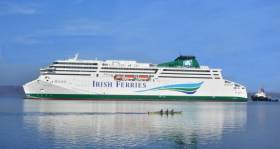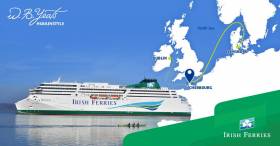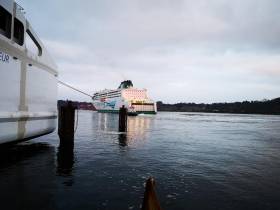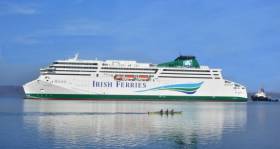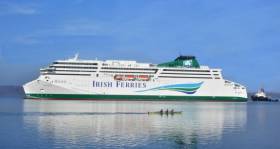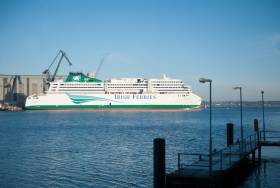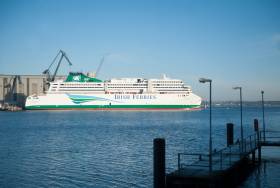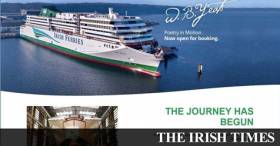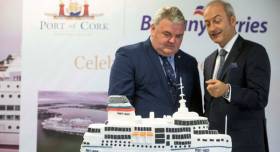Displaying items by tag: WB Yeats
W.B. Yeats to Arrive Today in Rosslare Where 'Europort' Is Centre Stage to Minister's Reaction on Irish Ferries Announcement
#ferry - Irish Ferries W.B. Yeats inaugural call to France yesterday for berthing trials in advance of starting service from Dublin in 2019, is to be followed today with a call to Rosslare Europort before finally completing the maiden delivery voyage to the capital, writes Jehan Ashmore.
The €144m cruiseferry built in Germany for parent company Irish Continental Group (ICG), was originally to begin service this summer. Delays by contractors supplying the shipyard, caused much disruption to high-season holidaymakers, that led to a revised entry of service on the Dublin-Cherbourg route now scheduled for mid-March.
Despite yesterday's facebook announcement from Irish Ferries to inform customers that they are unlikely to operate a service between Rosslare and France in 2019, Afloat adds according to online tracking, the Cypriot flagged W.B. Yeats is scheduled to arrive in Rosslare Europort at around 12 noon today.
The call by the new cruiseferry is to enable berthing trials and is no doubt just a practical exercise to cover all contingency scenarios across the company's route network.
Minister's Response on Rosslare routes future
In response to the announcement, a statement was issued late last night from the Minister of State for Tourism and Sport, Brendan Griffin TD regarding Irish Ferries Rosslare service. "I note Irish Ferries' communication this evening regarding their Rosslare service.
The service is an important transport service for the South East region. From a tourism perspective, while it mainly facilitates Irish tourists holidaying in France, it also brings French and other European tourists to the South East region.
Given the importance of these services, I have asked my officials to engage with the company."
Afloat adds if the outcome of no Rosslare based service arises in 2019, the Europort however will maintain direct links to mainland Europe as Stena Line operate a Rosslare-Cherbourg service.
Competition however could arise (taking the place of Irish Ferries), as according to The Irish Times yesterday, an operator already serving between Ireland and the UK, has approached the Wexford port to consider a service given the potential of a post-Brexit and thus releasing pressure out of Dublin Port. The capital's port is notably where 80% of freight from Ireland currently goes through the port via the UK landbridge with onward links chiefly through Dover to mainland Europe.
For further related coverage albeit from yesterday, including reaction from the Irish haulage sector, click here.
Historical Backgound
The south-east port is where Irish Ferries has operated established routes to France for decades, as the Cherbourg service is a legacy of predecessor Irish Continental Line (ICL) having been launched in 1978. The route to Normandy was followed with a service to Roscoff in neighbouring Brittany but opened by the current operator in 1995, however services including those connecting Cork had ceased before 1998.
In that year, a single ship took over both the remaining Rosslare based routes on the direct Ireland-France routes when the 1982 built Normandy was introduced, but the ageing ferry was eventually replaced by current cruiseferry, Oscar Wilde.
As for the year-round operated route from Rosslare to Cherbourg, this ended prematurely this year, having taken place several months ago. This was a strategic move by the operator, as the Rosslare based cruiseferry Oscar Wilde was redeployed to assist ropax Epsilon on the Dublin-Cherbourg route, given the delay of W.B. Yeats that was to enter during the summer months serving Normandy.
The second route out of Rosslare, to Roscoff in neighbouring Brittany, however was based on a seasonal only basis.
Should both routes not resume service in 2019, this would mark the end of an association of direct passenger and freight links between Ireland and France. The company can trace its origins through predecessors that began the first direct continental service launched 50 years ago, albeit between Rosslare and Le Havre in 1968.
So what next awaits the future of Oscar Wilde? given the former Scandinavian ship was launched 31 years ago.
W.B. Yeats Makes Debut to France, However Routes from Rosslare Unlikely to Operate in 2019
#ferry - Since Afloat's tracking on Sunday of German built cruiseferry W.B. Yeats in Danish waters, the brand new ship crossed the North Sea to France, completing a first leg of a delivery voyage to Ireland, writes Jehan Ashmore.
The €144m cruiseferry ordered by Irish Continental Group (ICG) for division, Irish Ferries, docked in Cherbourg earlier today for berthing trials. The call was in advance of the 1,800 passenger/1,200 vehicle cruiseferry entering service on the Dublin-Cherbourg route in mid-March 2019.
In a facebook posting from Irish Ferries late this afternoon, they informed customers that they are unlikely to operate a service between Rosslare and France in 2019. The operator added that they will continue to keep this situation under review and stated that their new W.B. Yeats ship will operate from Dublin to Cherbourg up to 4 days per week.
Irish Ferries also commented that "a majority of our customers have a clear preference for the more central location and easy access of Dublin".
Prior to the debut to France of W.B. Yeats today, the Cypriot flagged 54,000 gross tonnage newbuild also made a transit through the Strait of Dover. This is the world's busiest shipping lane, where up to 400 ships daily transit the narrow strait between the UK and France.
While W.B. Yeats was in these busy waters, ferries were routinely shuttling between Dover and Calais, served by rivals, P&O and DFDS. The latter operator is a giant Danish owned shipping group that briefly entered the Irish Sea ferry market, though ro-ro operations now are concentrated on the English Channel. In addition to services on the North Sea where an extensive freight network serves Scandinavia and beyond in which Afloat will have more to report.
As for passengers operations on the Dublin-Cherbourg route, customers can look forward to the service operated by the luxury ferry that was many months overdue of this summer's intended introduction. Delays of the 194m newbuild during the crucial high-season, were caused by contractors in supplying the shipbuilder, Flensburger Schiffbau-Gesellschaft (FSG) located in Flensburg. This led to cancellations resulting in a major disruption effecting up to 19,000 passengers.
The year-round operated Dublin-Cherbourg route, was first launched by Irish Ferries back in 2014, initially served by ropax Epsilon based on a economy no-frills service. From autumn this year, the more-freight orientated ferry was joined by cruiseferry Oscar Wilde, having ended the more established seasonal Rosslare based routes to France. The Cherbourg route began in 1978, albeit by predecessor, Irish Continental Line (ICL) whereas the route to Roscoff was added by Irish Ferries in 1995.
The deployment in recent months of the 31,000 tonnes Oscar Wilde to Dublin (incl. to Holyhead) has provided an increased choice of service and sailing capacity, while W.B. Yeats remains to enter service in early 2019. Added to this will be the backdrop of whatever Brexit scenario arises, when the new cruiseferry is launched on the direct route linking Ireland and mainland Europe.
In the meantime, W.B. Yeats, today carried out berthing trials firstly at the linkspan on the Quai de Normandie. Following this, the cruiseferry which has 440 cabins, including luxury suites with private balcony sea views and a dedicated butler service, docked at the adjacent Quai de la France.
At this quay is the former Trans Atlantic Ocean liner terminal (Gare Maritime Transatlantique) that still stands and is located in the centre of the port. This grand historic building is occupied by the maritime museum, La Cité de la Mer.
It will be just a few more days in welcoming W.B. Yeats arrival to Dublin Port according to Irish Ferries. The completion of the maiden delivery voyage, will represent the largest ever cruiseferry for the operator in terms of gross tonnage, compared to the current flagship Ulysses which is 50,000grt and serves on the Dublin-Holyhead route.
W.B. Yeats Now In Danish Waters Before Delivery Voyage to Ireland Via France
#Ferry- Irish Ferries brand new W.B. Yeats which departed from its German shipyard yesterday, has it transpired seemingly taken a different delivery route bound for Ireland as previously outlined, writes Jehan Ashmore.
The 54,983 gross tonnage W.B. Yeats having departed shipbuilder Flensburger Schiffbau-Gesellschaft (FSG) in Flensburg, was understood to be taking a short-cut through the Kiel Canal, Germany into the North Sea. Instead, however the 194m cruiseferry headed northward into the Kattegat, the sea between Denmark and Sweden.
The new €147m cruiseferrry, accommodating 1,885 passengers and crew and 1, 200 vehicles, along with fleetmates, is a client of Matrix Ship Management which has its head office based in Limassol. The port city is a renowned international hub for ship management.
Afloat tracked the Cypriot flagged W.B. Yeats this morning off the Danish coast between Saeby on the mainland and Læsø, the largest island in the Kattegat. Alongside of the cruiseferry, was the Latvian flagged Zircon apparently supplying bunkers (fuel).
It remains uncertain as to which way W.B. Yeats is to continue the maiden delivery route to Dublin en-route via Cherbourg, where these ports form the direct Ireland-France route the cruiseferry is to enter service in mid-March 2019, and not this summer as originally scheduled due to delays caused by sub-contractors cited FSG.
On the capital-continental route W.B. Yeats will offer customers a total of 440 cabins, including luxury suites with private balconies. Such a feature from rivals, Brittany Ferries was introduced in 2004 when flagship Pont-Aven was launched on the Cork-Roscoff route.
W.B. Yeats is understood to be scheduled to arrive in Cherbourg in the early hours of Wednesday, before continuing also next week its maiden delivery voyage to Dublin Port.
As of this afternoon, the tanker Zircon remains alongside the largest newbuild ever ordered by Irish Continental Group and the first from a German shipyard, FGS, where Brittany Ferries cruiseferry Honfleur was launched on Friday. The liquified natural gas (LPG) powered cruiseferry built for English Channel service is due also to enter service next summer.
Returning to Danish waters, where working in relative proximity of W.B. Yeats this afternoon was the diminutive domestic ferry, Margfrete Laesoe which compared to W.B. Yeats, is only 3,688 in gross tonnage terms.
Margfrete Laesoe operated by Færgeselskabet Læsø K/S, has capacity for just over 500 passengers and 76 cars, on crossings made between Vestoroe on Læsø and Frederikshavn on the Jutland peninsula. The service taking 1 hour 30 minutes to complete.
Currently, Irish Ferries Dublin-Cherbourg route takes between 17 and 19 hours to complete and is served by cruiseferry Oscar Wilde and ropax Epsilon offering an economy no-frills service.
W.B. Yeats Finally Departs German Shipbuilder for Ireland But Is Bound First for French Port
#ferry - Irish Ferries W.B. Yeats which suffered delays stretching back to early summer when originally due to enter a route to France, finally departed the German shipbuilders today for Ireland but is first bound for Cherbourg, writes Jehan Ashmore.
The €147m W.B.Yeats launched by shipbuilder Flensburger Schiffbau-Gesellschaft (FSG) in Flensburg, was tracked by Afloat this afternoon as the giant Cypriot flagged cruiseferry proceeded down the Flensburg Fjord shared between German and Danish waters.
At 54,985 gross tonnage, the newbuild is the largest ever cruiseferry ordered by parent company, Irish Continental Group (ICG) which said earlier this week the new ship is due to make a delivery voyage to Dublin next week. Capacity is for 1,885 passengers accommodated in 435 cabins, including luxury suites featuring balconies is provided with a dedicated butler service. As for cars and freight trucks, there is space for 1,200 vehicles.
The delivery of the 194m cruiseferry had been delayed at the FSG shipyard which attributed the delay to receiving parts late from suppliers. This in turn led to major disruptions to holiday-makers, as sailings scheduled were cancelled on the Dublin-Cherbourg route effecting up to 19,000 passengers.
Introduction of W.B. Yeats in 2019, will see up to four sailings a week served by W.B. Yeats on the direct continental route linking Ireland and France, where the flagship will be making berthing trials in Cherbourg. Afloat understands that the newbuild is scheduled to arrive in the Normandy port on Wednesday.
The W.B. Yeats will travel 125,000 nautical miles annually, which is the equivalent of circumnavigating the globe nearly 6 times. Sailings served by the cruiseferry will begin from mid-March to the end of September, and Irish Ferries can continue to claim to be the only operator providing customers with direct crossings to mainland Europe with the convenience of Dublin Port.
W.B. Yeats becomes the first custom-built passenger car ferry, since a predecessor of ICG, the Irish Continental Line (ICL) which was semi-state owned, introduced new tonnage in the form of Saint Patrick.
This considerably smaller ferry of around 5,000 gross tonnage, and also German built, launched ICL's first season in 1973, following a gap since another concern, Normandy Ferries pulled the plug at the end of the 1971 season. There would be no service the following year, as the company cited they could no spare the ferries on the Ireland-France connection due to demands of other services.
Cruiseferry WB Yeats Set to Dock in Dublin Port Following Cancellations
#ferry -Cruiseferry WB Yeats, which was originally scheduled to begin Dublin-France operations almost five months ago, is expected to dock in the capital next week, Irish Ferries has said.
As The Irish Times writes, the shipping company cancelled 6,000 bookings on the ferry in August and September, with the travel plans of at least 19,000 people affected.
This followed the cancellation of all bookings on the WB Yeats for more than two weeks in July, which affected about 10,000 people.
The company blamed “extraordinary circumstances beyond its control”.
The delivery of the €147 million vessel had been delayed by German shipbuilder FSG which, in a statement, attributed the delay to receiving parts late from suppliers.
For further reading click here and previous Afloat coverage prior to first sea-trials.
#FerryNews - Ferry and container shipping company, Irish Continental Group (ICG) has set aside space for a post-Brexit duty-free shop on its new passenger ferry, the WB Yeats (see sea trials).
As The Irish Times reports, Brussels ended duty-free shopping for those travelling between European Union member states in 1999, despite lobbying from the Republic. However, it could return on journeys to the UK depending on the nature of its exit deal.
ICG, owner of Irish Ferries, is one of a number of companies that believes the UK’s exit from the EU next April could herald a return of tax- and excise-free shopping for travellers between that jurisdiction and the Republic.
The group has set aside space for duty-free retailing in a shop on the upper floor of its newest ferry, the €144 million WB Yeats, in case low-cost alcohol, tobacco and perfume make a return following Brexit. The newbuilt cruiseferry as Afloat also reported today is due to operate on the daily Dublin to Holyhead route.
For more from the newspaper on the duty-free development, click here.
#FerryNews - While Irish Ferries flagship Ulysses is currently out of service, Afloat also reports on the much delayed €150m cruiseferry W.B. Yeats which is finally to begin sea-trials in the Baltic Sea, writes Jehan Ashmore.
W.B. Yeats last night departed the shipbuilder, Flensburger Schiffbau-Gesellschaft (FSG) in Flensburg. The shipyard located close the Danish border, experienced delays in the fitting out of interior components for public areas and on the electrical system installation in the hull and deckhouse.
According to FSG, back in June, the shipyard stated that entry into service is now planned for September. This final stage of construction work subcontracted by FSG, was further pushed back and so delayed again the debut of the 1,885 passenger/1,200 vehicles capacity cruiseferry which has accommodation in 435 cabins.
The largest ferry that is to connect Ireland-France, W.B. Yeats at 54,985 gross tonnage, was originally to start service on 12 July, firstly on the Dublin-Cherbourg route followed in September by a transfer to the Holyhead route in the winter months. As during that timeframe, ropax ferry Epsilon maintains the year round operated link connecting the Irish capital and France.
The postponement of W.B. Yeats by FSG, left Irish Ferries in a difficult situation that led to major disruption as sailings were cancellations during the peak-season. This involved affecting to varying degress the travel plans of thousands of holidaymakers.
Passengers were given the option of travelling on the company's more established continental routes through Rosslare served by cruiseferry Oscar Wilde which Afloat reported today has been operating this month both to Holyhead and Cherbourg on routes based out of Dublin.
Oscar Wilde since yesterday has begun covering the Rosslare -Pembroke route while routine cruiseferry Isle of Inishmore took over the sailing roster of Ulysses. The flagship as alluded in the introduction is off service from the Dublin-Holyhead route due to technical reasons.
Ferry Operator ‘Irish Ferries Understands it has Been Frustrating’ – the Understatement of the Week
#FerryNews -Irish Ferries last September announced that work had started in a German shipyard on a €144 million ship that would be the pride of its fleet. It said that, in accordance with tradition, a specially commissioned ceremonial coin would be placed in the keel during construction to “bring good luck and calm seas for the vessel”.
As The Irish Times writes, the coin has not done its job.
The “WB Yeats”– as the new boat was named following a public competition that attracted tens of thousands of submissions – has been dogged by bad luck, and its failure to arrive in Ireland on schedule ahead of a busy season of summer crossings has done untold damage to the reputation of Irish Ferries and left the holiday plans of tens of thousands of Irish passengers all at sea.
News that things were going awry with the luxury ferry – which has space for 1,885 passengers and crew, 440 cabins including suites with private balconies, and 3km of car deck space – first reached The Irish Times on April 20th. “There are rumours that Irish Ferries new €144m ship, which is scheduled to take passengers from Dublin to Cherbourg from July, is delayed by a few weeks,” a mail from a reader and would-be passenger started.
“The rumour is they are going to take the existing bookings and tell everyone they are going to be accommodated on the boat from Rosslare instead,” it continued.
To read more on the story click here.
#FerryNews - Trying to help people is Britanny Ferries with those who booked with Irish Ferries WB Yeats, but may not be able to accommodate many because they are nearly full for July and August.
As the Irish Examiner writes, Brittany Ferries chief executive Christophe Mathieu said some people who had booked trips to France with Irish Ferries had rebooked with his company for the Cork-Roscoff route, but space is now nearly at a premium.
Around 19,000 people have had their summer sailings to France cancelled due to a delay in the delivery of a new ferry to Irish Ferries.
Mr Mathieu made the comments yesterday at a special reception in Ringaskiddy, Co Cork, which marked 40 years since Brittany Ferries opened its Cork-Roscoff service.
“Brittany Ferries was only five years old when we launched services linking Roscoff and Cork back in 1978. In our first year of operations we carried just under 22,000 passengers on the MV Armorique,” said Mr Mathieu.
The newspaper had more here on the new Ireland-Spain service and the impact of Brexit.
#FerryNews - Operator Irish Ferries has confirmed that in the region of 5,000-10,000 customers will be affected by cancelled bookings on a new ferry, the delivery of which has been delayed.
The company writes The Irish Times, continued to make contact with booked passengers on Sunday, said it did not have an exact figure for numbers impacted at this stage.
A spokesman for Irish Ferries said that less than 10,000 passengers are impacted by the cancellations. “It is under 10,000, somewhere in the 5,000-10,000 segment,” he told The Irish Times on Sunday.
In a statement, the company said it cancelled a number of sailings from July 12th-29th as the German shipyard building the new vessel, the WB Yeats, informed Irish Ferries her delivery “is likely to be delayed”.
The company emailed affected passengers late on Friday evening stating that while the delay had yet to be “fully confirmed by the shipyard we have, in the interests of minimising the level of potential disruption to you, taken the decision to cancel your sailing”.
To read more including refunds for affected customers, click here.


























